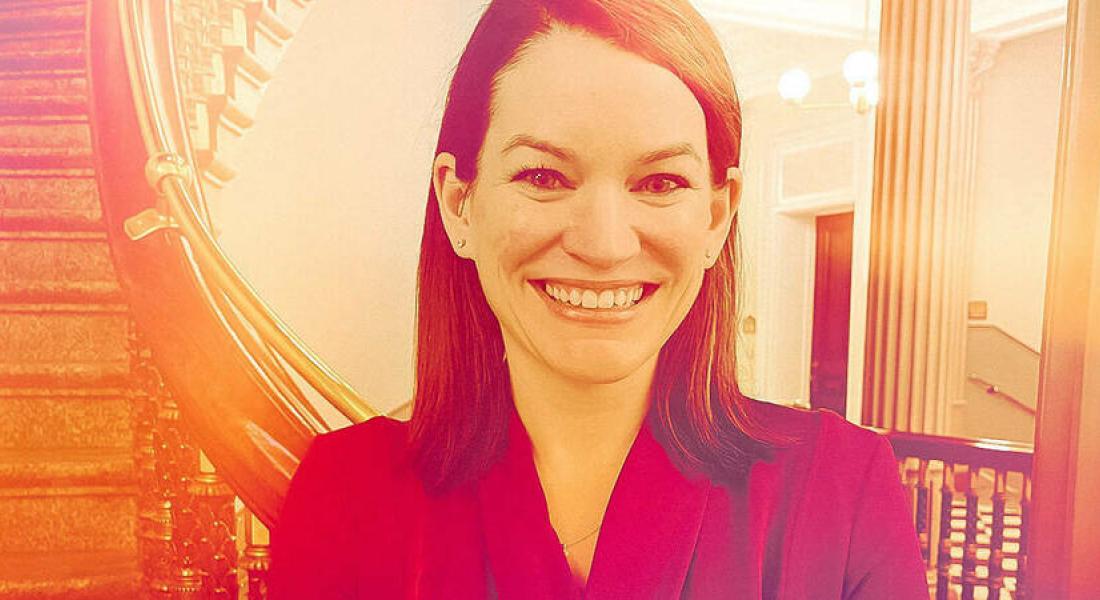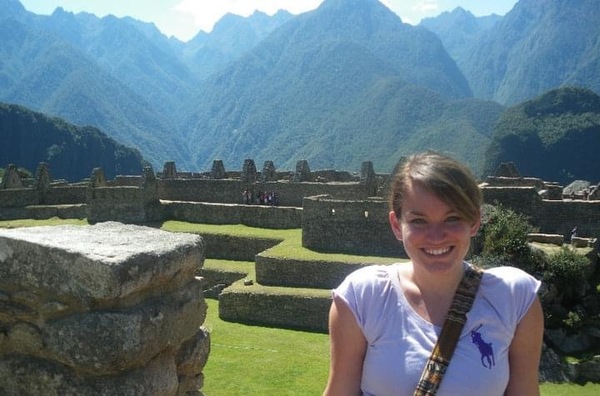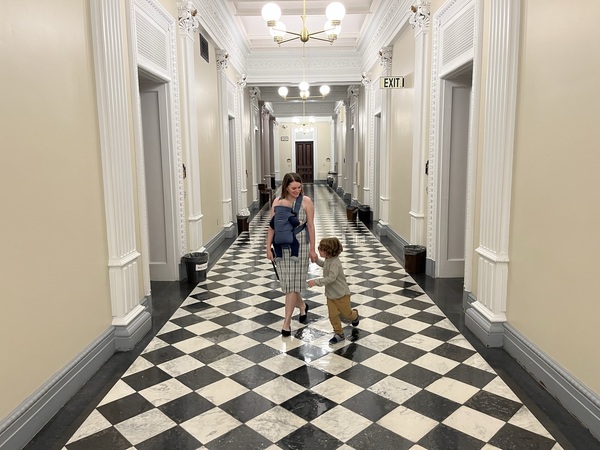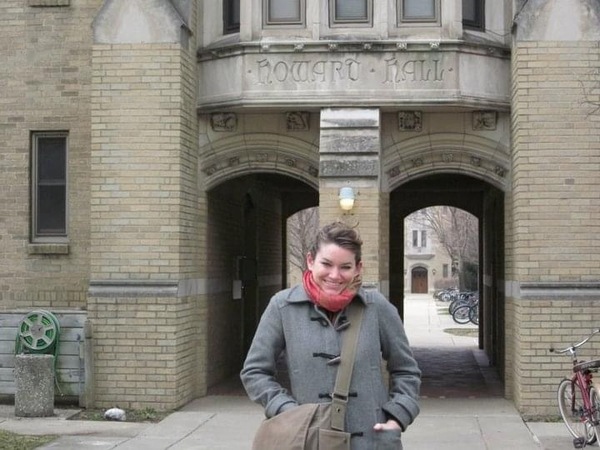
Stephanie Mulhern Ogorzalek ’11 wrote her senior thesis on gender and witchcraft in colonial Latin America. Fourteen years later, the Buffalo, New York, native is now working as the Director of Global Gender Issues with the White House Gender Policy Council — and sees a direct throughline from her studies at Notre Dame to her job at 1600 Pennsylvania Avenue.
“It was a history honors thesis about society’s different expectations of men and women, and how those expectations colored their treatment under the law,” Ogorzalek says. “I’m not sure, at the time, that anyone would have expected that a witchcraft thesis would lead to working as the Director of Global Gender Issues at the White House, but I’ve always been interested in gender and justice and human rights issues.”
That interest led Ogorzalek to the Kellogg Institute for International Studies at Notre Dame and, in between her freshman and sophomore year, she was accepted to the Institute’s International Scholars Program.
“Kellogg was the place to go if you were interested in international affairs, and it really set the course for me in the direction of my career. There was support and encouragement to explore the world and be curious,” says Ogorzalek, who majored in history and Spanish with a Latin American studies minor. “Notre Dame, with such a strong focus on human rights, and the Kellogg Institute, which gave me the freedom to spend time abroad and immerse myself in another place and deeply explore my interests, really informed what I did next.”
 Her first project as an International Scholar took her to Northern Peru, where she worked on an archaeological site during the summer between sophomore and junior year, studying gender roles across different historical periods. Ogorzalek also studied abroad in Spain and spent a summer doing research in Lima, Peru.
Her first project as an International Scholar took her to Northern Peru, where she worked on an archaeological site during the summer between sophomore and junior year, studying gender roles across different historical periods. Ogorzalek also studied abroad in Spain and spent a summer doing research in Lima, Peru.
After Notre Dame, she moved to Washington, D.C., and worked in government consulting, where she got to see the federal government work up close. Ogorzalek then went to earn a master’s degree in international economics and relations at the Johns Hopkins School of Advanced International Studies (SAIS), where she continued her focus on Latin America, spending a summer in Bogota, Colombia, working as a social development consultant in the Inter-American Development Bank’s gender and diversity division, and interning at the U.S. State Department in the Bureau of Western Hemisphere Affairs.
That internship led to a nine-year career at the State Department, where Ogorzalek expanded her focus from Latin America to Africa, spending five years in the Bureau of Democracy, Human Rights, and Labor, traveling frequently — including to Nigeria, Cameroon, Burkina Faso, Mauritania, Senegal, and the Gambia — to brief ambassadors and other U.S. officials on human rights issues in those countries.
“It was really important for me and my career to let myself grow and expand and continue to be curious, even though I was a little bit nervous to veer outside of my Latin American roots,” Ogorzalek says. “I ended up loving that job and I learned so much. I became very interested in the intersection of security and human rights, and conflict-related sexual violence as a pervasive human rights issue. Gender and human rights issues were a really core part of my work, and it was in doing that job that I realized I wanted to be spending more of my time focused on gender.”
The timing was perfect, because Ogorzalek was then given the opportunity to move to the Secretary’s Office of Global Women’s Issues at the State Department, where she was responsible for global gender-based violence issues. She went on to become the office’s director of gender-based violence and cross-cutting Issues, leading a team that focused on combating gender-based violence, promoting girls’ rights and empowerment, and jointly addressing gender equality and the climate crisis.
“Addressing gender is not only the right thing to do, but the smart thing to do. It’s strategic in a lot of ways,” says Ogorzalek. “In addition to being a human rights issue and a security issue, on the economic side, there’s more and more data that says women’s participation leads to better outcomes across a whole host of indicators.”
 Today, as the director of global gender issues at the White House, she is focused on integrating gender equality priorities across U.S. foreign policy and foreign assistance. Her job involves hearing from women and girls directly about their own lived experiences and collaborating with agencies across the federal government to ensure the integration of gender issues. She also liaises with foreign government partners to advance shared gender equality priorities, including through international fora such as the G7, G20, and upcoming March UN Commission on the Status of Women.
Today, as the director of global gender issues at the White House, she is focused on integrating gender equality priorities across U.S. foreign policy and foreign assistance. Her job involves hearing from women and girls directly about their own lived experiences and collaborating with agencies across the federal government to ensure the integration of gender issues. She also liaises with foreign government partners to advance shared gender equality priorities, including through international fora such as the G7, G20, and upcoming March UN Commission on the Status of Women.
“I’m grateful, in retrospect, to have parents who encouraged me to chart my own path. Never did I go into Notre Dame thinking, ‘Here’s how this career path will work. Here’s how these dotted lines will lead to the White House,’” Ogorzalek says. “It’s been exciting to follow that passion or interest at every stage, starting as an undergrad, and to continue trying to find work that felt meaningful and worth doing.”
That’s the message she brings with her when she comes back to campus to talk with current International Scholars and students in the Kellogg Institute.
“So often their questions are about [being] stressed about careers and career paths and needing to know every step. I think you really do need to let some of it unfold,” Ogorzalek says. “Now, looking back at my career and even starting at Notre Dame, it all makes sense, but it certainly wasn’t linear.”
Notre Dame inspired her to value public service, Ogorzalek says: “That, to me, has really been a guiding force directing me to want to work in government, directing me to want to use the position that I now have in government to do something impactful. I think so much of that does come back to the focus that was instilled in me at Notre Dame.”
 Ogorzalek’s husband, Jim Ogorzalek ’11, is a lawyer and a fellow alum, and they have two sons, Finn and Jack. She started her job at the White House after her maternity leave with Jack, and says, “The irony is not lost on me that I came back to a position where I am working to advance women’s economic security globally and strengthen global investments in childcare infrastructure while I am also living that in my own life as a working mom — all of which is enabled by the support of my incredible husband, who is the room parent and the maker of school lunches and the one who really makes the logistics of our busy life possible. The issues have never felt so close to home, and I feel incredibly fortunate to have the opportunity to contribute to work that is so important, so urgent, and has such potential to impact the lives of women and girls for the better.”
Ogorzalek’s husband, Jim Ogorzalek ’11, is a lawyer and a fellow alum, and they have two sons, Finn and Jack. She started her job at the White House after her maternity leave with Jack, and says, “The irony is not lost on me that I came back to a position where I am working to advance women’s economic security globally and strengthen global investments in childcare infrastructure while I am also living that in my own life as a working mom — all of which is enabled by the support of my incredible husband, who is the room parent and the maker of school lunches and the one who really makes the logistics of our busy life possible. The issues have never felt so close to home, and I feel incredibly fortunate to have the opportunity to contribute to work that is so important, so urgent, and has such potential to impact the lives of women and girls for the better.”
This story was originally posted at weare.nd.edu.
The Kellogg Institute for International Studies, part of the Keough School of Global Affairs at the University of Notre Dame, is an interdisciplinary community of scholars and students from across the University and around the globe that promotes research, provides educational opportunities, and builds partnerships throughout the world on the themes of global democracy and integral human development.





